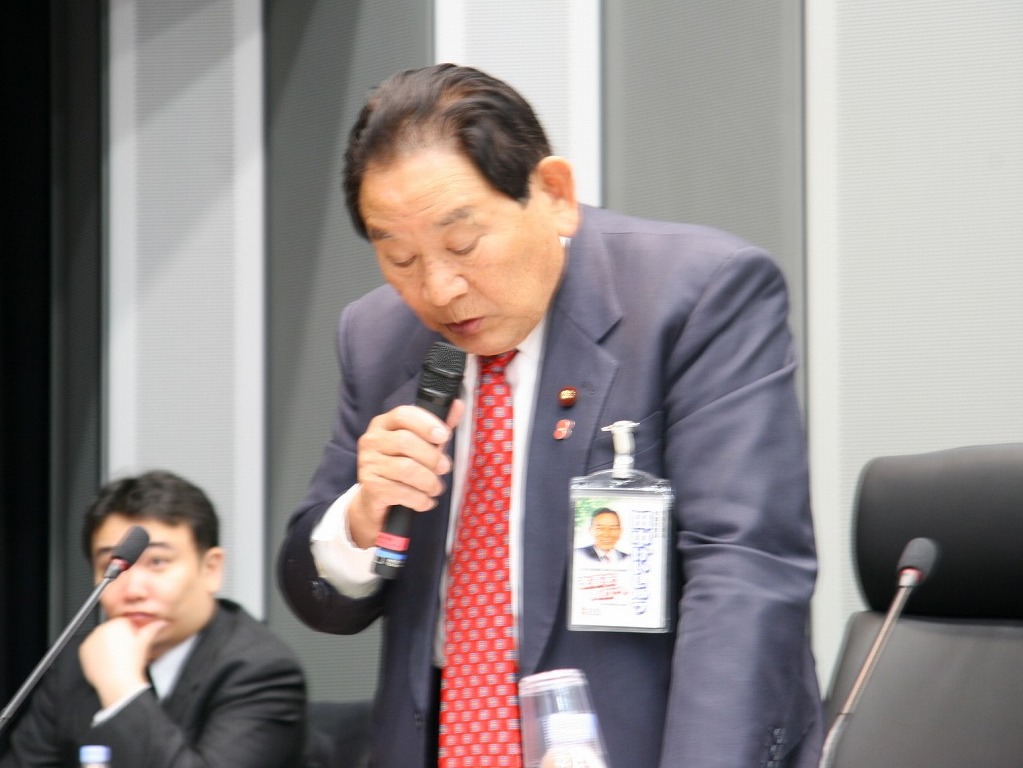Stroke Policy Forum 2011
date : 1/26/2011

Health and Global Policy Institute, together with an alliance of stroke-related organizations operating as the Council to Promote Legislation on Stroke Control, held the Stroke Policy Forum 2011 for the benefit of Diet Members and other figures concerned with measures on stroke prevention and control. The event was held in the Members’ Office Building of the House of Councillors in central Tokyo.
Stroke is the third leading cause of death among Japanese people, while cerebrovascular disease, including stroke, accounts for around 30% of all bedridden patients. Controlling the devastating effect of stroke demands comprehensive cross-sector measures, ranging from prevention and public awareness all the way through emergency ambulance services, acute phase treatment, convalescence, rehabilitation, and care, and the need for a Basic Law on Stroke Prevention and Control has increasingly been urged since around 2008 by The Japan Stroke Association, The Japan Stroke Society, numerous patient groups, institutes, academics, and more. Given this growing momentum for enactment of a Basic Law, this Forum was convened as an emergency session to coincide with the January 2011 opening of the ordinary session of the Diet.
At the Forum, with the participation of Diet Members, patient groups, medical experts, journalists, and others, a very active discussion took place urging the adoption of a Basic Law on Stroke Prevention and Control. Leading figures in the field of stroke control were invited to Japan from the U.K. and Canada to share their insights into how their countries have developed comprehensive measures that have realized a significant impact on stroke prevention and control.
Dr. Damian Jenkinson, National Clinical Lead for the National Health Service’s Stroke Improvement Programme, described first how stroke prevention has been strengthened in the U.K. through conducting awareness campaigns to improve public understanding of stroke and stroke care. He also explained how, with the creation of Stroke Care Networks, the U.K. has been able to achieve a smooth and consistent process of care from the onset of stroke through to treatment and rehabilitation, thereby improving patients’ quality of life while also reducing healthcare costs. In addition, Chris O’Callaghan, Executive Director of the Ontario Stroke Network in Canada, spoke about the results of the stroke strategy in the Province of Ontario, where local care networks for hospital, home, and primary care have been established around local Stroke Centers, improving the emergency care system and reducing rehospitalization rates. In developing a plan for stroke prevention and control, both speakers emphasized the importance of involving on-site healthcare providers, the various specialist practitioners, paramedics, patient representatives, and other stakeholders in regular evaluation and review of policy.
With lawmakers from both ruling and opposition parties discussing the issue in a bipartisan manner, with opinions offered from both sides but all aiming at adoption of a Basic Law during the current Diet session, the Forum truly felt like a major step toward realization of a Basic Law to Promote Stroke Prevention and Control.
Stroke is the third leading cause of death among Japanese people, while cerebrovascular disease, including stroke, accounts for around 30% of all bedridden patients. Controlling the devastating effect of stroke demands comprehensive cross-sector measures, ranging from prevention and public awareness all the way through emergency ambulance services, acute phase treatment, convalescence, rehabilitation, and care, and the need for a Basic Law on Stroke Prevention and Control has increasingly been urged since around 2008 by The Japan Stroke Association, The Japan Stroke Society, numerous patient groups, institutes, academics, and more. Given this growing momentum for enactment of a Basic Law, this Forum was convened as an emergency session to coincide with the January 2011 opening of the ordinary session of the Diet.
At the Forum, with the participation of Diet Members, patient groups, medical experts, journalists, and others, a very active discussion took place urging the adoption of a Basic Law on Stroke Prevention and Control. Leading figures in the field of stroke control were invited to Japan from the U.K. and Canada to share their insights into how their countries have developed comprehensive measures that have realized a significant impact on stroke prevention and control.
Dr. Damian Jenkinson, National Clinical Lead for the National Health Service’s Stroke Improvement Programme, described first how stroke prevention has been strengthened in the U.K. through conducting awareness campaigns to improve public understanding of stroke and stroke care. He also explained how, with the creation of Stroke Care Networks, the U.K. has been able to achieve a smooth and consistent process of care from the onset of stroke through to treatment and rehabilitation, thereby improving patients’ quality of life while also reducing healthcare costs. In addition, Chris O’Callaghan, Executive Director of the Ontario Stroke Network in Canada, spoke about the results of the stroke strategy in the Province of Ontario, where local care networks for hospital, home, and primary care have been established around local Stroke Centers, improving the emergency care system and reducing rehospitalization rates. In developing a plan for stroke prevention and control, both speakers emphasized the importance of involving on-site healthcare providers, the various specialist practitioners, paramedics, patient representatives, and other stakeholders in regular evaluation and review of policy.
With lawmakers from both ruling and opposition parties discussing the issue in a bipartisan manner, with opinions offered from both sides but all aiming at adoption of a Basic Law during the current Diet session, the Forum truly felt like a major step toward realization of a Basic Law to Promote Stroke Prevention and Control.
Exhibition date:2011-01-26
Top Research & Recommendations Posts
- [Policy Recommendations] The Path to a Sustainable Healthcare System: Three Key Objectives for Public Deliberation (January 22, 2026)
- [Research Report] Perceptions, Knowledge, Actions and Perspectives of Healthcare Organizations in Japan in Relation to Climate Change and Health: A Cross-Sectional Study (November 13, 2025)
- [Research Report] The 2025 Public Opinion Survey on Healthcare in Japan (March 17, 2025)
- [Policy Recommendations] Reshaping Japan’s Immunization Policy for Life Course Coverage and Vaccine Equity: Challenges and Prospects for an Era of Prevention and Health Promotion (April 25, 2025)
- [Research Report] The 2023 Public Opinion Survey on Satisfaction in Healthcare in Japan and Healthcare Applications of Generative AI (January 11, 2024)
- [Research Report] AMR Policy Update #4: Cancer Care and AMR (Part 1)
- [Public Comment Submission] “Assessment Report on Climate Change Impacts in Japan (Draft Overview)” (December 24, 2025)
- [Policy Recommendations] Developing a National Health and Climate Strategy for Japan (June 26, 2024)
- [Research Report] The 2026 Public Opinion Survey on Healthcare in Japan (February 13, 2026)
- [Research Report] The Public Opinion Survey on Child-Rearing in Modern Japan (Final Report) (March 4, 2022)
Featured Posts
-
2026-01-09
[Registration Open] (Hybrid Format) Dementia Project FY2025 Initiative Concluding Symposium “The Future of Dementia Policy Surrounding Families and Others Who Care for People with Dementia” (March 9, 2026)
![[Registration Open] (Hybrid Format) Dementia Project FY2025 Initiative Concluding Symposium “The Future of Dementia Policy Surrounding Families and Others Who Care for People with Dementia” (March 9, 2026)](https://hgpi.org/en/wp-content/uploads/sites/2/dementia-20260309-top.png)
-
2026-02-05
[Registration Open] (Webinar) The 141st HGPI Seminar “Current Status and Future Prospects of Korea’s Obesity Policy: Voices of People with Lived Experience in Policy Promotion” (March 3, 2026)
![[Registration Open] (Webinar) The 141st HGPI Seminar “Current Status and Future Prospects of Korea’s Obesity Policy: Voices of People with Lived Experience in Policy Promotion” (March 3, 2026)](https://hgpi.org/en/wp-content/uploads/sites/2/hs141-top-1.png)









